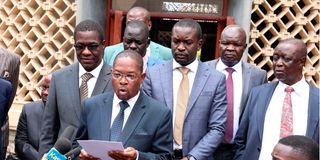President Ruto, MPs headed for clash over housing levy deductions

Senate Minority Leader Stewart Madzayo and Azimio la Umoja One Kenya coalition party parliamentary group at Parliament Buildings on March 16, 2023.
Parliament is headed for a clash with President William Ruto over housing tax deductions the court declared discriminatory.
The development comes after MPs set in motion plans to have the Kenya Kwanza government refund Kenyans amounts collected between August and November.
Senate Minority Leader, Stewart Madzayo, said relevant committees of the two Houses should commence plans to ensure those deducted are refunded by the Kenya Revenue Authority (KRA).
Senate committees, including Roads, Transport and Housing and the Finance and Budget, are to liaise with counterpart teams at the National Assembly to ensure Kenyans get their money back.
Also Read: You’ve no choice, Ruto says on housing levy
“I call on the two committees to liaise with the counterparts at the National Assembly with the view of stopping further deductions from Kenyans and come up a clear plan on how KRA will refund the money,” Senator Madzayo told the House on November 30.
The Kilifi Senator added that when he issued a statement regarding the unconstitutional introduction of the levy, he highlighted the inconsistencies in the projected collections and expressed concern over its discriminatory nature.
“The introduction of the Housing levy through the amendment of Section 84 of the Finance Act...whose effects introduces an amendment to the Employment Act is unconstitutional,” he said.
“It takes cognizant of the High Court ruling that declared the levy unconstitutional. The tax has to pass the rule of law test and must have a rationale connection to the legitimate government purpose, otherwise the taxation legislation will be arbitrary and unconstitutional.”
The lawmaker said the projected levy for the current financial year is Sh 63.2billiuon, the 24/25 financial year is Sh70 billion and 2025/2026 will be Sh78 billion.
Additionally, Mr Madzayo called for a re-evaluation of the Finance Act, 2023 with a view to align it with the Constitution.
Also Read: State moves to widen housing levy net
“In light of the same, the committees on Finance and Budget and Justice, Legal Affairs and Human Rights should to liaise with counterparts in the National Assembly to re-evaluate the Finance law 2023,” he said.
The senator said the move is necessary following a ruling by the High Court on November 28 declaring the levy discriminatory and creating unequal principles.
Already, President Ruto through National Assembly Majority Leader Kimani Ichung’wah has introduced the Affordable Housing Bill, 2023 that seeks to ensure the government complies with the ruling.
However, Parliament is in recess until February. National Assembly Speaker, Moses Wetang’ula will, therefore, be required to convene a special sitting to speed up the passage of the legislation to beat the January 10, 2024 deadline.
A three-judge bench said the levy violates the principles of taxation. They added that it is discriminatory and unfair by making a distinction between formal and informal income earners.
The judges said for any tax legislation to pass the rule of law, it must have a rational connection to a legitimate government purpose, otherwise, the law would be arbitrary.
Consequently, the judges said the government failed to provide an explanation for the imposition of the levy or a legal framework to anchor it.
In early August, the government backdated the Housing Levy deductions to July 1, 2023, and appointed KRA as the collecting agent.
This was after the Court of Appeal overturned an order suspending the implementation of the Finance Act, 2023.
National Treasury Cabinet Secretary, Njuguna Ndung’u, had argued that the government was losing billions of shillings as a result of the freeze.
The government is targeting to collect at least Sh211.2 billion in the next three financial years to support construction of 250,000 housing units every year.
The State Department for Housing and Urban Development said the levy would be payable by a worker and the employer at the rate of 1.5 per cent of the gross monthly pay.
Workers, whether on permanent and pensionable terms or contract, started contributing to the Fund in July.
Justices David Majanja, Christine Meoli and Lawrence Mugambi suspended their earlier judgment after KRA, the Attorney-General and Mr Wetang’ula pleaded for a 45-day stay.





